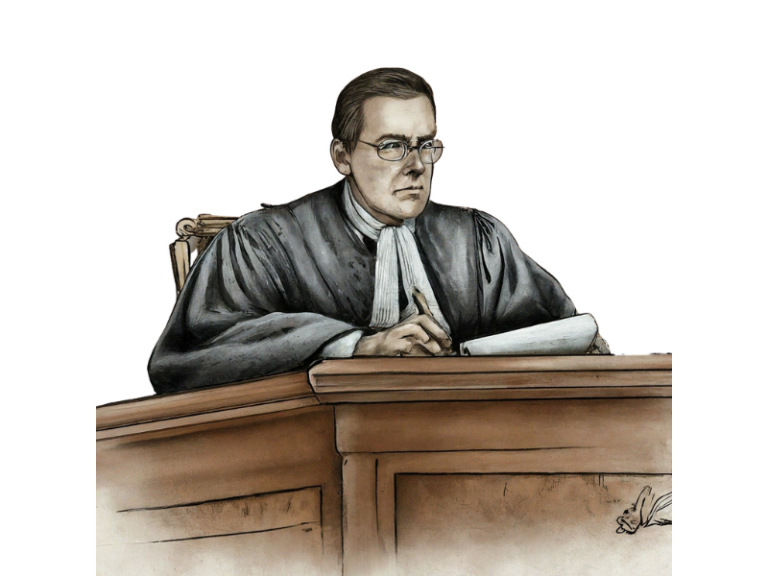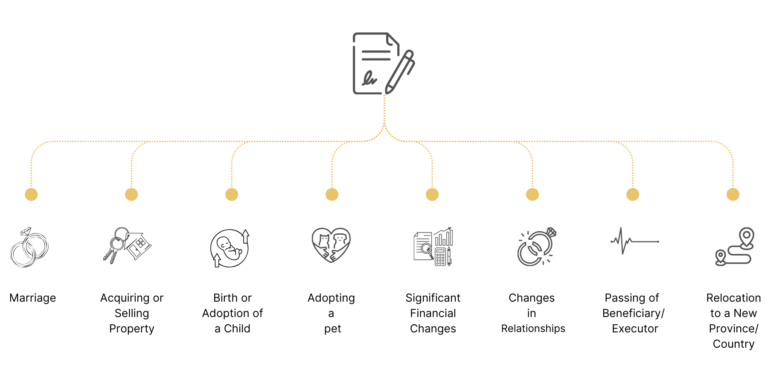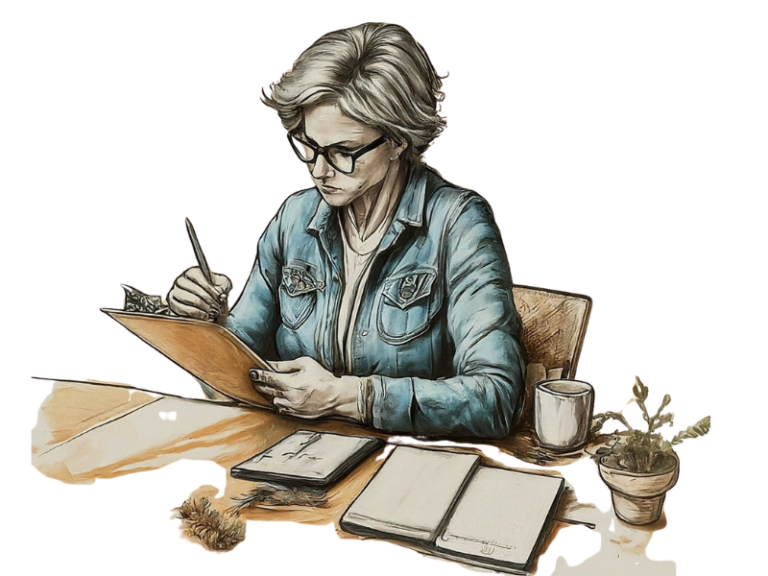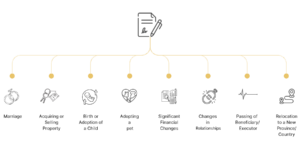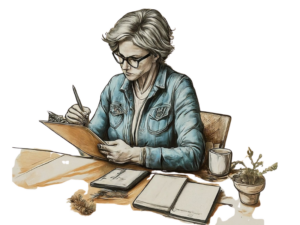Imagine the sudden loss of a loved one who has not left a will behind. This situation can be distressing and confusing, especially when it comes to handling their estate. This is where the concept of intestacy comes into play.
What is Intestacy?
Intestacy happens when someone dies without a valid Will. A Will is a legal document that outlines how a person’s estate—everything they own—should be divided upon their death. Without a Will, the distribution of assets is governed by provincial and territorial intestacy laws, which may not align with the deceased’s personal wishes.
The Legal Process of Intestacy
When someone dies intestate, the legal process generally unfolds as follows:
- Appointment of an Executor or Administrator: The court appoints an executor (if a Will exists) or an administrator (if no will exists) to manage the estate
- Inventory of Assets: All assets of the estate are identified and valued
- Payment of Debts and Taxes: The estate’s debts and taxes are paid before any distribution of assets
- Distribution According to Laws: The estate is distributed according to the intestacy laws of the relevant province or territory
- Final Settlement: After distribution and settlement of legal matters, the estate is formally closed
Understanding intestacy laws is crucial because it dictates how your estate will be divided if you die without a Will. Intestacy laws vary by province and territory, which means that the distribution of your assets might not align with your personal wishes. To ensure that your estate is handled according to your preferences, it’s essential to create a Will.
Now, let’s explore how intestacy is managed across different provinces and territories in Canada, and what this means for you and your loved ones. For more detailed nuances refer to our Intestate Module.
| Province | Spouse Only | Spouse and Children | No Spouse, Only Children | No Spouse, No Children |
|---|---|---|---|---|
| Alberta | Spouse gets 100% of the estate | • If children are also children of the spouse: Spouse gets 100% of the estate • If children are not children of the spouse: Spouse receives 1/2 of the estate and the remainder is divided among the children | • Children inherit equally • If a child is deceased, their children (grandchildren) inherit their share | • Estate is divided equally between the parents • If no surviving parents, the estate is divided equally among siblings • If a sibling is deceased, their children (nieces and nephews) inherit their share |
| British Columbia | Spouse gets 100% of the estate | • If one child from the same spouse: Spouse receives the first $300,000, and the remainder is divided equally between the spouse and the child • If more than one child or children not from the same spouse: Spouse receives the first $150,000, and the remainder is divided equally between the spouse and the children | • Children inherit equally • If a child is deceased, their children (grandchildren) inherit their share | • Estate is divided equally between the parents • If no surviving parents, the estate is divided equally among siblings.- If a sibling is deceased, their children (nieces and nephews) inherit their share |
| Manitoba | Spouse gets 100% of the estate | • If children are also children of the spouse: Spouse gets 100% of the estate • If children are not children of the spouse: Spouse receives the first $50,000 (or half of the estate, whichever is larger) and 1/2 of the remainder. The rest is divided among the children | • Children inherit equally • If a child is deceased, their children (grandchildren) inherit their share | • Estate is divided equally between the parents • If no surviving parents, the estate is divided equally among siblings • If a sibling is deceased, their children (nieces and nephews) inherit their share |
| New Brunswick | Spouse gets 100% of the estate. | • If one child: Spouse receives all marital property and the remainder is divided equally between the spouse and the child • If more than one child: Spouse receives all marital property and 1/3 of the remainder. The other 2/3 is divided equally among the children | • Children inherit equally • If a child is deceased, their children (grandchildren) inherit their share | • Estate is divided equally between the parents • If no surviving parents, the estate is divided equally among siblings • If a sibling is deceased, their children (nieces and nephews) inherit their share |
| Newfoundland and Labrador | Spouse gets 100% of the estate | • If one child: Spouse and child equally share the estate • If more than one child: Spouse receives 1/3 of the estate, and the rest is split equally among the children • If a child is deceased, their children (grandchildren) inherit their share | • Children inherit equally • If a child is deceased, their children (grandchildren) inherit their share | • Estate is divided equally between the parents • If no surviving parents, the estate is divided equally among siblings • If a sibling is deceased, their children (nieces and nephews) inherit their share |
| Northwest Territories | Spouse gets 100% of the estate. | • If one child: Spouse can elect to receive either $50,000 or the matrimonial home, and the remainder of the estate is divided equally between the spouse and the child • If more than one child: Spouse can elect to receive either $50,000 or the matrimonial home, and 1/3 of the estate. The remainder is divided equally among the children | • Children inherit equally • If a child is deceased, their children (grandchildren) inherit their share | • Estate is divided equally between the parents • If no surviving parents, the estate is divided equally among siblings • If a sibling is deceased, their children (nieces and nephews) inherit their share |
| Nova Scotia | Spouse gets 100% of the estate. | • If one child: Spouse receives the first $50,000 or the home, and the remainder is divided equally between the spouse and the child • If more than one child: Spouse receives the first $50,000 (or the home) and 1/3 of the estate. The remainder is divided equally among the children | • Children inherit equally • If a child is deceased, their children (grandchildren) inherit their share | • Estate is divided equally between the parents • If no surviving parents, the estate is divided equally among siblings • If a sibling is deceased, their children (nieces and nephews) inherit their share |
| Nunavut | Spouse gets 100% of the estate. | • If one child: Spouse can elect to receive $50,000 or the home, and the remainder is divided equally between the spouse and the child • If more than one child: Spouse can elect to receive $50,000 or the home, and 1/3 of the estate. The remainder is divided equally among the children | • Children inherit equally • If a child is deceased, their children (grandchildren) inherit their share | • Estate is divided equally between the parents • If no surviving parents, the estate is divided equally among siblings • If a sibling is deceased, their children (nieces and nephews) inherit their share |
| Ontario | Spouse gets 100% of the estate | • If one child: Spouse receives the first $350,000 and the remainder is split equally between the spouse and the child • If more than one child: Spouse receives the first $350,000 and 1/3 of the remainder. The remaining 2/3 is divided equally among the children | • Children inherit equally • If a child is deceased, their children (grandchildren) inherit their share | • Estate is divided equally between the parents • If no surviving parents, the estate is divided equally among siblings • If a sibling is deceased, their children (nieces and nephews) inherit their share |
| Prince Edward Island | Spouse gets 100% of the estate | • If one child: Estate is split evenly between the spouse and child • If more than one child: Spouse receives 1/3 of the estate, and the remainder is split among the children | • Children inherit equally • If a child is deceased, their children (grandchildren) inherit their share | • Estate is divided equally between the parents • If no surviving parents, the estate is divided equally among siblings • If a sibling is deceased, their children (nieces and nephews) inherit their share |
| Quebec | • Spouse gets 100% of the estate • If no children and parents are surviving then spouse gets 2/3 and 1/3 is divided between parents | • Spouse receives 1/3 of the estate, and the remaining 2/3 is divided equally among the children • If not surviving children then 1/3 is divided between parents, if not surviving parents, then 1/3 is divided among siblings | Children inherit equally | Estate is divided between parents (1/2 of the estate) and siblings (remaining 1/2 is shared equally) |
| Saskatchewan | Spouse gets 100% of the estate. | • If all children are also children of the spouse: Spouse gets 100% of the estate • If children are from a different relationship: Spouse receives the first $200,000 and: – If one child, the remainder is divided equally between the spouse and the child – If more than one child, the spouse gets 1/3 of the remainder, and the other 2/3 is divided among the children | • Children inherit equally • If a child is deceased, their children (grandchildren) inherit their share | • Estate is divided equally between the parents • If no surviving parents, the estate is divided equally among siblings • If a sibling is deceased, their children (nieces and nephews) inherit their share |
Cost Comparison: With a Will vs. Without a Will
Creating a will is an effective way to manage the distribution of your estate and can save your loved ones significant time and money. Here’s a rough comparison:
- Without a Will (Intestacy):
- Legal Fees: $4,000 to $15,000 depending on the complexity and province
- Time: The process can be lengthy, sometimes taking months to over a year
- With a Will:
- Legal Fees: $800 to $4,000 depending on the complexity and province
- Time: The process is generally quicker and more straightforward
Take Control Today
Don’t leave your legacy to chance. With Willezy, you can create a will that reflects your desires and protects your family. It’s an investment in clarity, peace, and efficiency. Sign up today and your loved ones will thank you for your clarity and ease.


